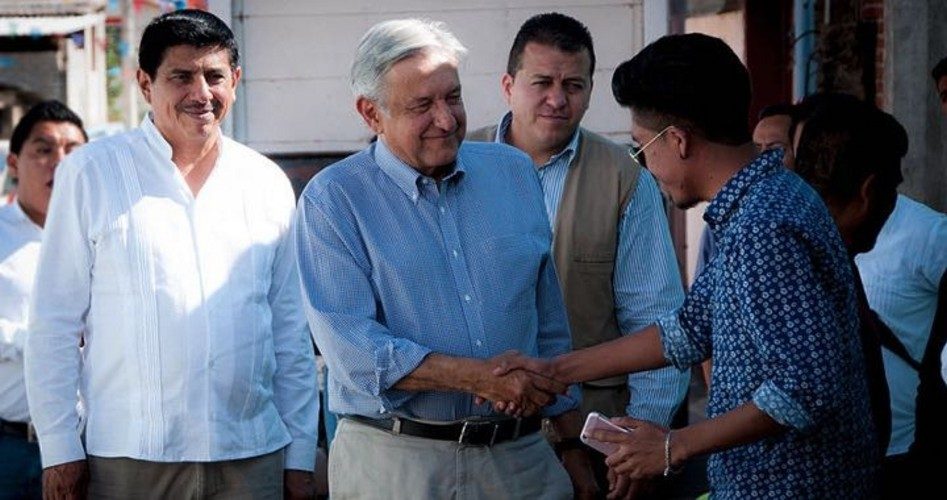
As Mexico prepares to vote on Sunday, July 1, former Mexico City Mayor Andres Manuel Lopez Obrador (shown in center), or AMLO as he is commonly called, holds a 20-point lead in the polls over his three closest rivals. And AMLO is promising big changes once elected.
AMLO’s party, the National Regeneration Movement (MORENA) is the most leftist of the parties involved in the presidential race and has allied itself with the Labour Party and the Social Encounter Party. Currently AMLO is polling at 51 percent, 20 points ahead of Ricardo Anaya of the National Action Party. Jose Antonio Meade of the Institutional Revolutionary Party (PRI) — the party currently in power, which is described as “center-right” — is running a distant third and Jamie (“El Bronco”) Rodriguez, an independent, rounds out the field.
AMLO has been running on a populist platform of doing away with the rampant corruption in Mexican politics, and that message has struck a chord with the average citizen. They see AMLO as a leader who will “drain the swamp” Mexican style. The current party in power is the PRI party, which has run Mexico for 77 of the last 90 years and is seen as corrupt, with good reason. The PRI has run a defacto oligarchy, with most of the power resting with just a few politicians. The PRI is also alleged to have extensive ties to organized crime in Mexico.
But how will this new “revolution” look?
Critics of AMLO cast him as a leftist strongman in the mold of Hugo Chavez. But as the mayor of Mexico City, he governed in a relatively pragmatic manner. He gave out cash allotments to distressed groups such as the elderly, disabled, and unemployed, and built social housing along with a new university. He also imposed austerity measures on the city, such as lowering the pay of city officials.
But that pragmatism may have been a product of having to work with the PRI, which held AMLO in check. The current platform of AMLO’s MORENO party regularly touts the nationalization of industry, left-wing populism, and social democracy.
AMLO denies any similarities to Chavez or Venezuela. Or to Donald Trump, for that matter. “Let’s be very clear,” AMLO said. “We are not inspired by any foreign governments, neither Maduro (the current Venezuelan president) nor Trump.”
The final years of his mayoral tenure in Mexico City were marred with scandals. In 2004, videos emerged of close associates of AMLO gambling in Las Vegas and receiving bribes. AMLO blamed the release of the videos on a “mafia of power,” which was looking to intentionally harm him. Later that year, a coalition of political parties voted to remove AMLO from his post as mayor of Mexico City because he had expropriated a tract of private land in order to build an entrance to a private hospital.
After being booted from office, AMLO ran for president in 2006, losing a razor-thin race to Felipe Calderon. AMLO cried foul, alleging that the election had been stolen from him. Instead of conceding, he called himself the legitimate president of Mexico and set up a shadow government, which failed, tarnishing his public image. AMLO ran again in 2012, finishing second to Mexico’s current president, Enrique Pena Nieto.
In 2014, AMLO abandoned the leftist PRD Party and formed the new National Regeneration Movement. The platform of the new party looks to put an end to corruption, and shift government spending toward public works and social programs.
In May, AMLO told a rather hostile group of bankers, “I will support banks. We won’t confiscate assets. No expropriations, no nationalizations. We’ll have a country more focused on its main problem: the cancer of corruption. That’s my proposal, to end corruption.”
And Mexico certainly needs an end to corruption. The country is rife with reports of local police shaking down citizens for money, politicians accepting bribes and government attachments to organized crime. More than 40 percent of Mexicans currently live below the poverty level. Violence is rampant in Mexico with more than 29,000 people murdered in 2017.
As many as 132 people have been killed as a result of this election, according to etellekt, a Mexican risk-analysis firm. Forty-eight of those assassinations were of candidates, with the rest being party workers. Twenty-two of the 32 Mexican states have seen a political assassination since last September.
AMLO’s MORENA party currently holds no seats in 128-member Senate of the Republic, none of the 32 governorships, and only 47 seats in the 500-member Chamber of Deputies. But MORENA is polling well during this election cycle. Should AMLO and MORENA win by large margins this Sunday, our neighbor to the south could change rather quickly.
Whether that means a quick end to the corruption that has plagued the nation for decades or a Hugo Chavez-like dictator staring at us from across the Rio Grande remains to be seen. But AMLO’s history of setting up shadow governments and his corruption-laden stint as mayor tend more toward Chavez than being a simple champion of the poor. As well, since its Mexico he is campaigning in, if he wasn’t corrupt, he would likely be dead already.
Photo of Andres Manuel Lopez Obrador: Israel.rosas83 via Wikimedia




